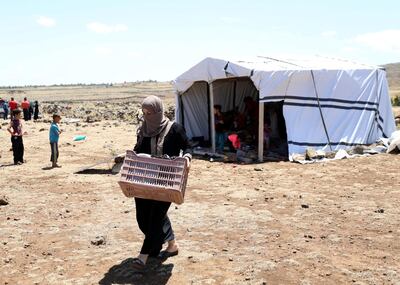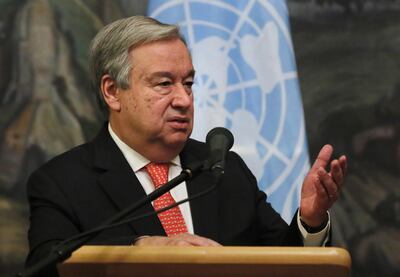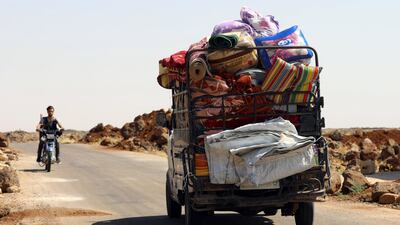The Syrian government has stepped up its offensive to recapture areas of the country's south over the weekend with an aerial offensive involving barrel bombs, missiles and outlawed munitions, forcing as many as 20,000 civilians to flee.
President Bashar Al Assad has vowed to press an offensive against rebel-held areas of southern Syria despite an internationally backed "de-escalation" deal was reached between the US, Russia and Jordan last year.
Government forces dropped napalm – which is banned internationally – and phosphorus, opposition officials claimed.
"For the first time, the regime has dropped 12 barrel bombs since the de-escalation agreement on villages northeastern Daraa. Four were dropped this morning [Saturday] on Busr al-Harir," said Col Saber Sifer, the political representative of a south Syrian FSA group called the Hamza division.
"We remain committed to the de-escalation agreement, but the regime has intensified artillery shells and missile strikes. It has also used napalm on the town of Masaifra against civilians in the countryside of Daraa." The use of napalm against civilians is banned under international law but has taken place on dozens of occasions during the seven-year Syrian civil war.
______________
Read more
Syrian regime drops barrel bombs in Daraa
Thousands of Syrian flee as regime steps up bombardment in the south
______________
Government forces also attacked Busr Al Harir and Musaifra with phosphorus, according to Bashar Zoubi, a political representative with a rebel umbrella group in southern Syria. The attack caused a number of injuries and forced more people to flee to safer areas in the south, he said.
The UK-based Syrian Observatory for Human Rights said on Thursday that 12,500 have fled their neighbourhoods in the past few days. But as fighting intensified, a civil defence operation room in Daraa estimated that 20,000 had left by Saturday morning. Rebels said the numbers were increasing and families are struggling to find shelter and complained of a shortage of tents, flour and milk.

"So far 20,000 people have fled their areas since the attacks started, mostly from the eastern parts of Daraa to areas near the Jordanian borders. And the numbers are increasing by the day," said Mr Zoubi, who is based in Turkey.
“The regime has intensified its offensive while, unfortunately, we have not seen any action by the guarantors. The US has issued warnings, but the Assad regime continued its offensive. We will not give up. We are still looking for an international intervention to end the fighting and to reach a political solution.”
Mr Al Assad's military offensive has caused anxiety in Jordan, one of the guarantors of the de-escalation agreement which has largely held for almost a year. The collapse of the ceasefire agreement signed in July 2017 risks regional instability, could undermine Jordan and may deepen the conflict between Israel and Iran.
Jordan is host to 1.3 million Syrians - 650,000 of whom are registered by the UNHCR. It fears an influx of refugees on its borders.
Some of the areas that citizens fled to are a few kilometres from the Jordanian border.
King Abdullah of Jordan arrived in Washington on Friday and is expected to discuss the situation with US officials.
Ayman Safadi, the Jordanian foreign minister, said in a tweet that Jordan was intensifying its contacts with its partners in the de-escalation deal to safeguard the ceasefire agreement.
"We are closely monitoring the developments and stress the need to respect the agreement. We are working to prevent the explosion of violence. Our borders and interests are protected," he said.
In a report issued on Thursday, the International Crisis Group warned that in the absence of a negotiated deal, the alternative is a full-scale Syrian military offensive in the south-west that would come at a terrible cost to civilians, to Jordan, to Israel as well as Syria and its Iranian and Russian allies.
However, it said there is still room for a negotiated alternative, but only if all sides recognise the opportunity and seize it.
“There’s still a window for a negotiated alternative, but not for long,” said Sam Heller, senior analyst at International Crisis Group. “The de-escalation deal can be preserved, and built on. But all sides will have to commit to negotiations, especially the Americans.”
A big offensive risks a wider escalation, as the US has warned Damascus it will respond to breaches of a de-escalation brokered by Washington and Russia last year to contain the war in the south-west.

United Nations Secretary-General Antonio Guterres on Friday demanded an immediate end to military escalation in southwestern Syria, saying he was "concerned at the significant risks these offensives pose to regional security," a spokesman for the UN chief said.
Nikki Haley, US Ambassador to the United Nations, said on Friday that the Syrian military escalation "unambiguously violates" the de-escalation arrangement and that more than 11,000 people had been displaced.
"Russia will ultimately bear responsibility for any further escalations in Syria," Ms Haley said.

